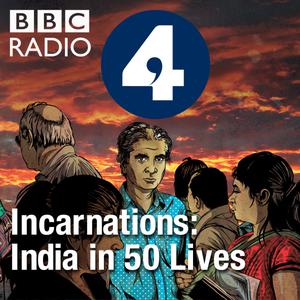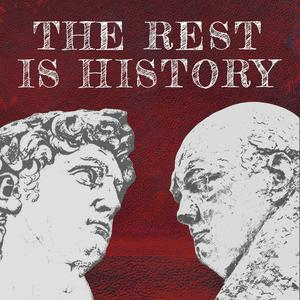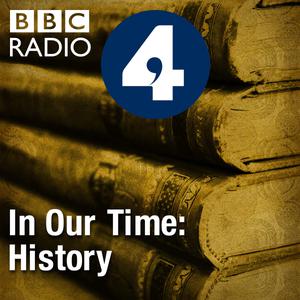
Incarnations: India in 50 Lives
BBC
The history of India told through the lives of 50 phenomenal people.
- 14 minutes 13 secondsDhirubhai Ambani: Fins
Professor Sunil Khilnani from the King's India Institute in London, on the life and legacy of the Indian business tycoon Dhirubhai Ambani, founder of Reliance Industries. The son of a penurious schoolteacher, Ambani credited himself with an almost animal instinct for trading, coupled with a steel trap memory and an appetite for audacious risk. Today fifteen per cent of all India's exports go out in his company's name. It's the ultimate rag to riches story, mixed with street cunning and dazzling deals. In one case, which began with a tip from an underworld don, Ambani executives were accused of violating the Official Secrets Act by possessing sensitive Cabinet documents, including a draft national budget. A joke quickly did the Delhi rounds: the budget wasn’t leaked to Reliance; Reliance had leaked the budget to the ministry. Producer: Mark Savage Editor: Hugh Levinson
25 March 2016, 2:00 pm - 14 minutes 6 secondsMF Husain: Hindustan Is Free
Professor Sunil Khilnani, from the King's India Institute in London, looks at controversy over the Indian artist MF Husain, who spent the last days of his life in exile. Husain is considered by some to be the face of modern art in India but not necessarily by people in India itself. Husain died in his nineties having completed around ten thousand works. His paintings often attracted high prices but he became a target for mob anger over his portraits of Hindu goddesses and Indian feminine icons. Female deities had often shown nude in traditional art, but what enraged right-wing Hindus was that these images were created by a Muslim artist. "Had Husain been less popular beforehand, he probably would have been less hated." says Professor Khilnani. Producer: Mark Savage
24 March 2016, 2:00 pm - 14 minutes 9 secondsCharan Singh: A Common Cause
Professor Sunil Khilnani, from the King's India Institute in London, explores the life and legacy of Charan Singh, the lawyer turned politician who championed the cause of India's farmers. Singh is remembered today as the politician who took on Indira Gandhi in the Congress Party’s heartland state. Uttar Pradesh. He redistributed power and altered the social structure of Northwest India, non violently. And he helped the world see the potential of the Indian farmer a bit more clearly. He succeeded in becoming India's first peasant prime minister but went from the highest office in a flash, replaced by his nemesis Indira Gandhi. Although today he is most often remembered for being a leader of his own caste, Professor Khilnani argues that Charan Singh has a unique status in Indian history. Producer: Mark Savage
23 March 2016, 3:08 pm - 13 minutes 44 secondsSatyajit Ray: India without Elephants
Sunil Khilnani explores the life and work of filmmaker Satyajit Ray.
In the history of Indian cinema, there is a Before Ray, and an After. As Sunil Khilnani says, “he’s the first truly modern filmmaker we have.” But Satyajit Ray’s career in India might not have continued past its first few films had he not been celebrated in the West.
In his native Bengal, several of his films were popular. More were loathed. In today’s thriving Bengali film culture, he’s often held at arm’s length: the guy who served it up for the West, and served it up a little sweet.
But Ray’s films made ideas hanging in the air feel fresh, for he brought to them an unusually large range of small gifts: psychological and sensory acuity, humour, humanism, a deep appreciation of family relationships, an ability to withhold judgement, an ear equally adept at dialogue and sound, and the visual imagination of a third-generation illustrator and photographer. These were sufficient to allow him, time and again, to achieve a realism few in Indian cinema wanted to meet.
“It’s the truth in a situation that attracts me,” he told his actors. “And if I’ve been able to show it, that's enough for me.”
The result was a body of work of which the director Akira Kurosawa would remark, “Not to have seen the cinema of Ray means existing in the world without seeing the sun or the moon.”
Producer: Martin Williams
22 March 2016, 2:00 pm - 14 minutes 7 secondsIndira Gandhi: The Centre of Everything
Professor Sunil Khilnani, from the King's India Institute in London, looks at the life of Indira Gandhi, India's first woman prime minister, whose darkest moment was a two year period known as "the emergency". Jails filled up with her critics while journalists and editors were detained alongside the political opposition. Those arrested could be held without trial and and she attempted to reduce the birth rate by offering men incentives to be sterilized. "Indira Gandhi in many ways issued the greatest threat to democracy in independent India’s history," says Professor Khilnani, "weakening constitutional regularities established by her father. Yet the enduring effect of her rule was to open the state to a deeper and more accessible democracy". Producer: Mark Savage Music: Talvin Singh
21 March 2016, 3:08 pm - 14 minutes 19 secondsSubbulakshmi: Opening Rosebuds
Sunil Khilnani explores the life of south Indian singer MS Subbulakshmi.
Subbulakshmi’s singing voice, striking from the start, would ultimately range three octaves. A perfectionist, she had the capacity to range across genres but narrowed over the years to what another connoisseur of her music has called a ‘provokingly small’ repertoire. In time, the ambitions of those who loved and profited from her combined with her gift to take her from the concert stage to film to the All-India Radio to near-official status as an icon of independent India.
But, as Professor Khilnani says, “what was required of Subbulakshmi, in moving from South Indian musical celebrity to national cultural symbol, is deeply uncomfortable when considered through the prism of contemporary feminism.”
Producer: Martin Williams
18 March 2016, 2:00 pm - 14 minutes 18 secondsKrishna Menon: Sombre Porcupine
Professor Sunil Khinani, from the King's India Institute in London, looks at the life of Krishna Menon, the abrasive Indian diplomat and statesman who invented the concept of non-alignment. He was one of the most reviled figures of the Cold War era. The Americans regarded Menon as a "mischief maker"; the British thought he was in bed with the Soviets while the Soviets thought he was a lackey of the British; and the Chinese resented his attempts to school them in international affairs. The diplomat, who was the voice of India's foreign policy for almost two decades, pursued an agenda which deeply unsettled the superpowers. But, says Professor Khilnani, "Menon's approach helped give India an influential voice at the global diplomatic table, dominated by the big four powers." Producer: Mark Savage Music: Talvin Singh
17 March 2016, 5:30 pm - 14 minutes 17 secondsSheikh Abdullah: Chains of Gold
Sunil Khilnani explores the life of Sheikh Mohammed Abdullah, the Lion of Kashmir.
Born in Srinagar as a burden, Abdullah’s father died before he was born. Dispossessed of their share of family property, Abdullah and his two elder brothers were expected to make the cheap cotton shawls on which their extended, devout family depended. But the young boy discovered he had a gift, for reciting the Koran, which allowed him to get out of darning. Eventually, it would help him see more of the world than his shabby corner of Srinagar.
But his legacy today is an ambivalent one. For many he stands as the primary, powerful advocate of Kashmiri self-rule, who sacrificed his own freedom time after time in his attempts to secure representation and rights for his people. For others, especially younger Kashmiris today, he’s the man who sold Kashmir out to India, first in the late-1940s and then again in the 1970s, in exchange for personal power.
Producer: Martin Williams
16 March 2016, 4:00 pm - 14 minutes 14 secondsRaj Kapoor: The Politics of Love
Professor Sunil Khilnani, from the King's India Institute, looks at the life of the celebrated actor and movie director Raj Kapoor who attracted a huge following well before the term 'Bollywood' became known. Kapoor started making films, just as India became independent in 1947. Back then, the medium was more than mere entertainment. In a country where the literacy rate was 12 per cent, film was also a crucial medium of education and exposure. "Kapoor brought romance, sexuality, song and soul to Indian socialism," says Professor Khilnani. Producer: Mark Savage
15 March 2016, 2:26 pm - 14 minutes 20 secondsBhimrao Ambedkar: Building Palaces on Dung Heaps
Professor Sunil Khilnani, from the King's India Institute, looks at the life of Bhimrao Ambedkar, champion of the community previously known as 'untouchables' whom he renamed as Dalits. Ambedkar, who was a Dalit himself and fought against caste discrimination. His face can be found on posters, paintings and coloured tiles in tens of millions of Dalit homes. To Indian schoolchildren, he is the man who wrote the country’s constitution; and to India’s politicians he is a public emblem of how far India has come in addressing the blight of caste. "Both readings simultaneously exaggerate and ghettoize Ambedkar’s contribution," says Professor Khilnani. "He was a sophisticated, long-sighted Constitutional collaborator whose interests extended past caste to the very structure and psychology of Indian democracy." Producer: Mark Savage
14 March 2016, 2:46 pm - 14 minutes 13 secondsManto: The Unsentimentalist
Sunil Khilnani explores the life and work of India's master of the short story Saadat Hasan Manto. Manto didn't fuss much over his sentences. He wrote in a rush, at hack speed, for money – and often legless drunk. His raw, visceral, personal response to his experiences – including the massacre at Amritsar, cosmopolitan Bombay and the horror of Partition – matched a historical moment that needed a raw, human response. In a divided country that Manto thought possessed "too few leaders, and two many stuntmen", his sentences asserted, plainly, the human facts – not the moral or political motives that produced them. As Professor Khilnani says, "for all the velocity that his economy of language creates, the pressure of a story builds slowly. You're never quite prepared for the moment that blasts off the emotional roof. His sentences etch a groove in the mind not because he saturates his truths about atrocity in lurid color, but because he delivers them off-hand, even elliptically."
Readings by Sagar Arya.
Producer: Martin Williams
11 March 2016, 5:54 pm - More Episodes? Get the App
Your feedback is valuable to us. Should you encounter any bugs, glitches, lack of functionality or other problems, please email us on [email protected] or join Moon.FM Telegram Group where you can talk directly to the dev team who are happy to answer any queries.
 Global News Podcast
Global News Podcast
 The Rest Is History
The Rest Is History
 The Morning Brief
The Morning Brief
 Empire
Empire
 Newshour
Newshour
 In Our Time: History
In Our Time: History